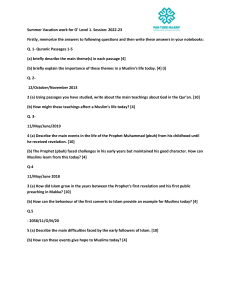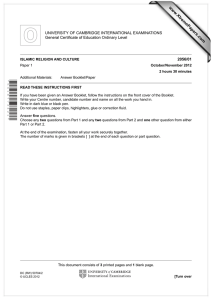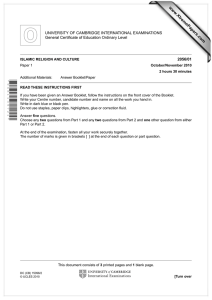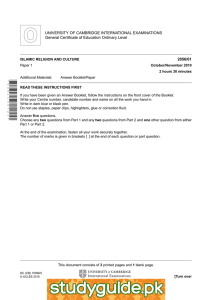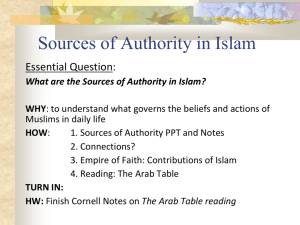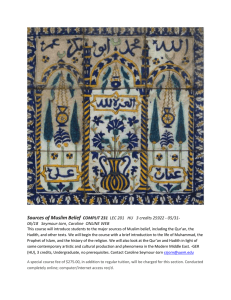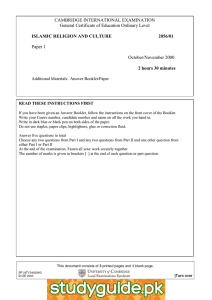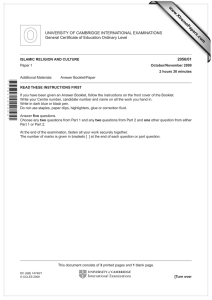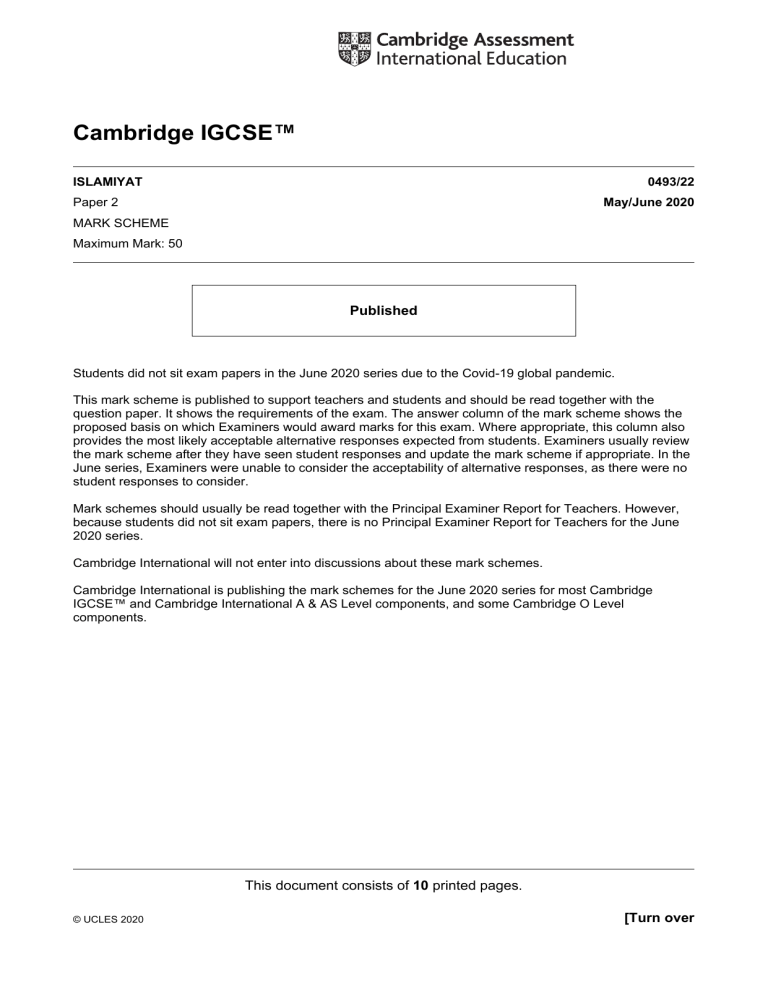
Cambridge IGCSE™ ISLAMIYAT 0493/22 Paper 2 May/June 2020 MARK SCHEME Maximum Mark: 50 Published Students did not sit exam papers in the June 2020 series due to the Covid-19 global pandemic. This mark scheme is published to support teachers and students and should be read together with the question paper. It shows the requirements of the exam. The answer column of the mark scheme shows the proposed basis on which Examiners would award marks for this exam. Where appropriate, this column also provides the most likely acceptable alternative responses expected from students. Examiners usually review the mark scheme after they have seen student responses and update the mark scheme if appropriate. In the June series, Examiners were unable to consider the acceptability of alternative responses, as there were no student responses to consider. Mark schemes should usually be read together with the Principal Examiner Report for Teachers. However, because students did not sit exam papers, there is no Principal Examiner Report for Teachers for the June 2020 series. Cambridge International will not enter into discussions about these mark schemes. Cambridge International is publishing the mark schemes for the June 2020 series for most Cambridge IGCSE™ and Cambridge International A & AS Level components, and some Cambridge O Level components. This document consists of 10 printed pages. © UCLES 2020 [Turn over 0493/22 Cambridge IGCSE – Mark Scheme PUBLISHED May/June 2020 Generic Marking Principles These general marking principles must be applied by all examiners when marking candidate answers. They should be applied alongside the specific content of the mark scheme or generic level descriptors for a question. Each question paper and mark scheme will also comply with these marking principles. GENERIC MARKING PRINCIPLE 1: Marks must be awarded in line with: • • • the specific content of the mark scheme or the generic level descriptors for the question the specific skills defined in the mark scheme or in the generic level descriptors for the question the standard of response required by a candidate as exemplified by the standardisation scripts. GENERIC MARKING PRINCIPLE 2: Marks awarded are always whole marks (not half marks, or other fractions). GENERIC MARKING PRINCIPLE 3: Marks must be awarded positively: • • • • • marks are awarded for correct/valid answers, as defined in the mark scheme. However, credit is given for valid answers which go beyond the scope of the syllabus and mark scheme, referring to your Team Leader as appropriate marks are awarded when candidates clearly demonstrate what they know and can do marks are not deducted for errors marks are not deducted for omissions answers should only be judged on the quality of spelling, punctuation and grammar when these features are specifically assessed by the question as indicated by the mark scheme. The meaning, however, should be unambiguous. GENERIC MARKING PRINCIPLE 4: Rules must be applied consistently e.g. in situations where candidates have not followed instructions or in the application of generic level descriptors. GENERIC MARKING PRINCIPLE 5: Marks should be awarded using the full range of marks defined in the mark scheme for the question (however; the use of the full mark range may be limited according to the quality of the candidate responses seen). GENERIC MARKING PRINCIPLE 6: Marks awarded are based solely on the requirements as defined in the mark scheme. Marks should not be awarded with grade thresholds or grade descriptors in mind. © UCLES 2020 Page 2 of 10 0493/22 Question Cambridge IGCSE – Mark Scheme PUBLISHED May/June 2020 Answer You must answer Question 1, Question 2, and two other Questions. 1 Choose any two of the following Hadiths, and: Hadith # 14 May God show mercy to a man who is kindly when he sells, when he buys, and when he demands his money back. Hadith # 3 Let him who believes in Allah and the Last Day either speak good or keep silent, and let him who believes in Allah and the Last Day be generous to his neighbour, and let him who believes in Allah and the Last Day be generous to his guest. Hadith # 17 Modesty produces nothing but good. Hadith # 10 One who manages the affairs of the widow and the poor man is like the one who exerts himself in the way of Allah, or the one who stands for prayer in the night or fasts in the day. © UCLES 2020 Page 3 of 10 Marks 0493/22 Question 1(a) Cambridge IGCSE – Mark Scheme PUBLISHED May/June 2020 Answer describe their teaching about what Muslims believe, and; 1(a)(i) The teachings of this Hadith show Muslims that God wants Muslims to act kindly towards each other in all aspects of life including all financial matters. The guidance given in the Hadith is that fairness, honesty and kindness should be the guiding principles of every transaction. The Prophet (pbuh) encouraged sympathetic behaviour towards the borrower and encouraged believers to carry out all dealings with fairness and justice. 1(a)(ii) Three kinds of action are referred to in this Hadith: • Controlling one’s speech • Being generous to one’s neighbour • Being generous to one’s guests The Prophet (pbuh) repeated the statement, ‘Let him who believes in Allah and the Last Day’ before each action to emphasise that a person’s every action results from his/her belief and encouraged believers to maintain harmony in the community and be a source of benefit to others. This is the main teaching of this Hadith. Candidates can develop their response further by saying how each action given in the Hadith stems from one’s faith. 1(a)(iii) This Hadith’s teaching stresses the virtues of modesty, as it creates a morally pious and respectful society. In Islam, modesty is of both body and mind. By being modest a believer will not just seek to promote his/her own self-interest, will not engage in anti-social activities and will be ashamed if he/she does something wrong. The core teaching of this Hadith is that modesty is an invaluable trait of Muslims that keeps them rooted in the path of God. Other Hadiths supporting the teachings given in this Hadith can be given by candidates to develop the answer. 1(a)(iv) The Hadith clearly explains the rights of the people with regards to one another. Islam promotes social justice and gives a lot of stress on the welfare of the whole community. In this Hadith the Prophet (pbuh) is giving the clear teaching that looking after the vulnerable in society is a moral duty of all those who have the capacity to do so. Widows and orphans are specifically mentioned as they are most in need of support in many countries and communities of the past and present. The broader teaching covers all those in need, be it financially or emotionally etc. Looking after them has been compared to worship by the Prophet (pbuh) as Islam is not just a set of rituals but a faith that encourages its followers to fulfil the rights of fellow beings. © UCLES 2020 Page 4 of 10 Marks 4 0493/22 Question 1(b) 1(b)(i) Cambridge IGCSE – Mark Scheme PUBLISHED May/June 2020 Answer explain how Muslims can put these teachings into action. The Hadith can be put into practice by: • Conducting all trade and business transactions honestly and fairly. • Not selling substandard goods and not keeping unfair profit margins. • Repaying debts as quickly as possible and showing respite to a debtor if they need extra time for repaying a debt. The above are some examples, however all valid examples are to be credited which show the implementation of the teaching of this Hadith. Examples can be given to substantiate the answer from the time of the Prophet (pbuh) or the Companions or even present times. 1(b)(ii) Muslims should follow the teachings of this Hadith by making sure that they use their speech responsibly i.e. do not back bite or slander people etc. They could develop their response by giving the Prophets example of how he never spoke harshly to his enemies etc. Muslims should be ready at all times to fulfil the needs of their neighbours, which will in turn create strong communal bonds. Examples of how guests were honoured by the Prophet (pbuh) and his Companions, or examples from present times could be written about to show the implementation of the teachings given in the Hadith. 1(b)(iii) Modesty can be practiced by taking a moderate/middle path. • A Muslim’s speech, dress, attitude towards life must not be ostentatious. • They must remain humble. • A Muslim must stay away from everything that would be displeasing to God. Modesty is also a shield against immorality and candidates could say that it can be practised by lowering one’s gaze in the presence of the opposite gender and by not being overly familiar with them. 1(b)(iv) The teaching can be implemented by: • Being generous and helpful to God’s creation. • By providing resources for the poor and needy e.g. providing social housing for the homeless, free healthcare to those who need it, providing education to those who cannot access it. • Giving advice and emotional support to widows and orphans is also another way to put the teachings of the Hadith into action. Examples could be given to develop the answer further. © UCLES 2020 Page 5 of 10 Marks 4 0493/22 Question 2(a) Cambridge IGCSE – Mark Scheme PUBLISHED May/June 2020 Answer Outline the relationship between the Qur’an and Hadith when formulating Islamic law. Marks 10 The rulings given in the Qur’an serve as a source of Islamic law, which cover all aspects of life. Some of them are however not in depth and for that reason the Hadith of the Prophet (pbuh) have to be referred to. For example, details for rules of inheritance, marriage, fasting, prayers etc. can all be found in the Hadiths. The use of the Sunna and Hadith are indispensable in the practice of Islam and the Qur’an itself. Many verses stress upon the need to follow the Prophet’s practice. • ‘So take what the Messenger gives you, and refrain from what he prohibits you.’ (al-Hashr, 59:7) The Prophet (pbuh) was sent to convey the message of God to humanity and to act upon it himself and explain it to the people. He therefore must be followed as the one who explains the Book, as the law giver, judge and ruler. The Hadith of the Prophet (pbuh) serve as a valid source of law to legislate in matters where the Qur’an is silent, or where a verse needs explaining or when it comes to restricting the meaning of a verse. • In verse 38 of Sura Maidah, it says: ‘As for the thief, male or female, cut off his hand or her hand; an exemplary punishment from Allah for their crime. Allah is Mighty, Wise.’ The Prophet (pbuh) explained the verse by saying, ‘the hand should be cut off for (the theft of) a quarter of a dinar or more’(Bukhari). However, because the cutting off a hand is a serious matter, it should not be executed for any case of theft. A combination of conditions must be met before a thief’s hand is cut off. Other examples of the Prophet’s Hadiths could be given as supplementing the Qur’anic verses. The Hadith help Muslims to fulfil the requirements of their faith in legal, social, economic and political matters as well as in matters of religion. For without them the Muslims would be unable to fulfil their primary obligations of fasting, praying, giving zakat, performing hajj. Here it could be added that the instruction to offer salat is in the Qur’an but Muslims fulfil this Pillar by following the practice of the Prophet (pbuh) who said ‘Pray as you see me praying’ and that ‘No salat is complete without al-Fatiha.’ It must be noted that the above is guidance to what can be expected in answers. All valid examples must be credited. 2(b) What is the importance of consensus (ijma) in the Muslim world today? Give reasons for your answer. An evaluative response is needed here. Responses should say why ijma is important in the Muslim world today not give an account of it. Answers could say that it creates unity in the Muslim world, Muslims can be certain that what they are given permission for, or the ruling made, is in line with the Qur’an and Sunna. Examples can be given to develop the answer and make a strong evaluative response. © UCLES 2020 Page 6 of 10 4 0493/22 Question 3(a) Cambridge IGCSE – Mark Scheme PUBLISHED May/June 2020 Answer Write a detailed account about the Battle of Yarmuk fought in the caliphate of ‘Umar. Marks 10 A detailed account of the Battle of Yarmuk needs to be given. It was fought in 636 between the Byzantines and the Muslims. The trigger for this battle was the Fall of Damascus, which alerted Heraclius to the Muslim threat from the east and the Byzantines organised a massive army at the Golan Heights. The Muslims under the command of Khalid ibn Waleed, Abu Ubaydah ibn al Jarra, Yazid ibn Abu Sufyan and Amr ibn al A’as also assembled in the Golan region. Khalid gave the Byzantines the option to accept Islam or pay jizya and when the two options were turned down the war began. The numbers of the forces vary in records, some say Muslims were between 20 000 to 24 000 and the Byzantines were in even greater numbers. Both sides were inspired by religious zeal. The main Battle of Yarmuk was preceded by a series of conflicts for about a month, and finally culminated in a major battle towards the end of August. The Muslims lured the Byzantines into the rough terrain by pretending to retreat and ambushed them. The Byzantine cavalry got separated from the infantry enabling the Muslims to inflict severe damage on them. A dust storm also unsettled the Byzantines, the main army driven west was trapped in rugged valleys. When Khalid stormed the Byzantine camp at Yaqusa all hope was lost, and the Byzantines were further demoralised by rumours that Christian Arabs had defected to the Muslim side. The defeat at Yarmuk was catastrophic for the Byzantines, whilst the victory enabled the Muslims to subdue other cities of Syria. 3(b) What was the significance of the conquest of Jerusalem in ‘Umar’s caliphate? Give reasons for your answer. Evaluative answer needed here focusing on the significance of the conquest of Jerusalem in 637. It could be said that: • Jerusalem was one city whose conquest was more symbolic than of military importance. Jerusalem was the city to which the Prophet (pbuh) travelled from Makka during Mairaj. • Jerusalem is where the Prophet (pbuh) led the prophets of the past in prayer before ascending to the heavens. • Whilst acknowledging the rights of Christians and Jews in Jerusalem, ‘Umar was keen to send the message that the city also belonged to the Muslims. • It marked the decline of the Byzantine dominance at the time. This question does not ask for accounts of how he travelled to Jerusalem or the details of the surrender of Jerusalem. © UCLES 2020 Page 7 of 10 4 0493/22 Cambridge IGCSE – Mark Scheme PUBLISHED Question 4(a) May/June 2020 Answer 10 Write about Muslim belief in: • divine books; and • prophets. A straightforward descriptive account of belief in divine books and prophets is being looked for in answers. Responses for each belief could contain the following: Divine Books Were sent to different prophets to guide humanity. They were meant to teach people their obligations to God and their fellow human beings. Belief in divine books revealed to earlier prophets before the revelation of the Qur’an is an essential aspect of Muslim faith. The books in order of revelation are: (i) (ii) (iii) (iv) (v) The Scrolls (Suhuf) of Ibrahim; The Torah (Taurat) revealed to Musa; The Psalms (Zaboor) revealed to Dawood; The Gospel (Injeel) revealed to Isa; and The Qur’an revealed to Prophet Muhammad (pbuh). The central message of all revealed books was the worship of the One true God. Divine books other than the Qur’an were for a specific time and community whereas the Qur’an is for all times and for all humanity. Earlier scriptures have been lost or tampered with and none exist in their original form or in the language they were revealed in except for the Qur’an. God has taken it upon Himself to protect the Qur’an from alteration and corruption. Prophets Belief in prophets is an Article of Muslim faith. Prophethood is a gift from God and all prophets possessed some common features. These are: • • • Prophets were both morally and intellectually superior to their nations. God bestowed some of His prophets with miracles. Every prophet confirmed that he was preaching the words of God and confirmed what was revealed before him and what may be revealed after him, thus confirming that the message of all prophets in essence was the same. The line of prophets started with Adam and ended with the Prophet Muhammad (pbuh). All prophets are to be respected without making any distinction amongst them. They were all human. They ate, drank, slept and lived normal lives and spoke the language of their communities. They were sent to guide humanity towards the worship of their Creator and to lead righteous lives. They also acted as role models for humanity. The mark is not divided equally between the two parts and the answer has to be read as a whole and an overall mark needs to be given. © UCLES 2020 Marks Page 8 of 10 0493/22 Cambridge IGCSE – Mark Scheme PUBLISHED May/June 2020 Question Answer 4(b) Why is belief in all prophets important in Islam? Give reasons for your answer. Marks 4 Each answer has to be read and marked on its own merits. Answers could say that: • Belief in all of them is important because they were all sent by God; or it could be said that it is written in the Qur’an that we should make no distinction between them, al Baqarah,2:285. • The Qur’an tells us stories of the various prophets of God sent over the ages which teaches Muslims respect for other revealed religions and promotes religious tolerance. • Every prophet carried the legacy of the prophet before him and the Prophet Muhammad (pbuh) carried this legacy in totality. • Though belief in all prophets is essential in Islam the Prophet Muhammad (pbuh) has the distinction of being the last prophet of God and was the one on whom the religion was perfected. All valid responses to be credited. Question 5(a) Answer How do Muslims prepare themselves for Friday (Jum’a) prayers and what are the special features of this prayer? A twofold response is needed here. The first part should give an account of how Muslims prepare for Friday (Jum’a) prayers and the second part should be about the special features of Jum’a prayers. Candidates could say that great reward has been promised for attending Jum’a prayers and worshippers should prepare themselves especially for this prayer by bathing, trimming their nails, wearing fresh and clean clothes, using ittar before arriving at the mosque. The special features of the Jum’a prayers it could be said are: • It is prayed at the same time as the zuhr prayer which it replaces. Two fard rak’aat are prayed for Ju’ma instead of the four prayed for zuhr. • It is prayed in congregation in a mosque behind an imam. • It cannot be prayed individually. • The imam delivers a sermon in two parts which is essential to listen to. • One sermon is distinguished from the other by a brief sitting by the imam. • After the sermon the prayer is led by the imam, only the fard rak’aat are prayed in congregation. © UCLES 2020 Page 9 of 10 Marks 10 0493/22 Question 5(b) Cambridge IGCSE – Mark Scheme PUBLISHED May/June 2020 Answer In your opinion, what are the benefits of praying in a mosque? Give reasons for your answer. A range of responses can be given. It could be said that it increases unity and brotherhood, you get to know your fellow Muslims as you meet them five times a day. Issues facing individuals or the community or even the ummah at large can be discussed. One gets extra reward for praying at the mosque. These are some reasons; candidates could give other benefits and all valid reasons given should be credited. © UCLES 2020 Page 10 of 10 Marks 4
